The post Rhaenrya Targaryen actor asked not to meet with her older replacement appeared first on Winter is Coming.
Via https://winteriscoming.net/2022/08/31/rhaenyra-targaryen-actor-asked-not-meet-older-replacement-milly-alcock-emma-darcy/
The first season of House of the Dragon has just started and we’re already getting production news for the second season. And I don’t think these are news any of us could have possibly expected: director Miguel Sapochnik, showrunner for season one with writer Ryan Condal, is moving forward from the show, while another Game of Thrones veteran is coming back for this prequel’s second season.
As you may recall, Miguel Sapochnik directed some of the most critically-acclaimed and grander-scale episodes in the later seasons of Game of Thrones: Hardhome, Battle of the Bastards, The Winds of Winter, The Long Night, The Bells… quite a resume! In this first season of House of the Dragon, he wasn’t only responsible for helming the series premiere and the sixth and seventh episodes (which we’ll see in a matter of weeks); he was also the co-showrunner, alongside writer Ryan Condal.
Per The Hollywood Reporter, Condal will now be the sole showrunner, although Sapochnik will remain credited as executive producer for the rest of the show. He’s also signed a “first-look deal” with HBO to work on new projects, so it seems the parting was as amicable as it could possibly be.
According to Sapochnik, “working within the Thrones universe for the past few years has been an honor and a privilege, especially spending the last two with the amazing cast and crew of House of the Dragon“, and he’s proud of all they accomplished, but, as “incredibly tough” as the decision was, he knows it’s the right choice, personally and professionally, to “move on.” Of course, he wishes Ryan Condal and the entire crew his best on season two, including Alan Taylor.
What’s that? “Alan Taylor”? Does he mean veteran Game of Thrones director Alan Taylor? The Alan Taylor who helmed season one’s show-defining final two episodes, Baelor and Fire and Blood, as well as several season two episodes and season seven’s Beyond the Wall? Alan Taylor, the award-winning director of several Rome, Mad Men, and The Sopranos episodes? That Alan Taylor? Yes, that one.
Taylor’s joining the show, although not to replace Sapochnik exactly, as he won’t be showrunning the show with Condal. Still, he’ll be one of the several executive producers and direct “multiple episodes” in season two.
“It’s a pleasure and an honor to be back at HBO, immersing myself in the world of the Targaryens,” Taylor says in a statement. “I look forward to working closely with Ryan as House of the Dragon grows into its second season. Ryan, Miguel and George have launched an extraordinary story, in a rich and fascinating world. Returning to Westeros will be a huge undertaking and I’m looking forward to the challenge.”
Meanwhile, HBO’s statement emphasizes the “amazing work” Sapochnik’s done on the first season, establishing “its signature look and feel”. As for the returning director, the statement says they’ve “had a decades-long relationship with Alan Taylor, and we are delighted to have him join Ryan and rest the talented team.”
So, how do you all feel about this? Happy? Sad? Neutral? Perhaps time will tell? Personally, I fell in love with Sapochnik’s direction in Hardhome, and that feeling didn’t change for the rest of Game of Thrones or, for that matter, when we saw his work again in the series premiere of House of the Dragon. That said, having Taylor back is a such a gift, and honestly I’d be more worried if the departing showrunner was Ryan Condal, who’s the one responsible for the show’s writing and appears to know this world inside and out. Still, I can’t help feeling sad. That feels appropriate.
Please say your fondest farewells to Miguel!
The post Co-showrunner Miguel Sapochnik leaves House of the Dragon; veteran Thrones director joins season two! appeared first on Watchers on the Wall.
Happy House of the Dragon Week episode 2 week, everyone! Remember me? It’s me from just last week! Wait, you don’t remember? Ah, that’s OK. I’ll remind you what I’m doing here. Every week, for each new episode of HOTD, I’ll be deconstructing the multitude of reviews out there, boiling them down to one short summary sentence that will perfectly encapsulate what the original author was saying, no questions asked…and by that I mean that I will deconstruct whole essays down to one sentence apiece, often quoting them verbatim.
What I will do is attempt to summarize the original review as best I can, and if my tease whets your appetite for their style of review, you are encouraged to head over to their site and let them know…after of course letting us know your thoughts in the comments below. At the bottom, I will summarize my review of the reviewers’ reviews.
All squared? Jolly good, let’s dive in.
What did the Internet think of HBO’s House of the Dragon episode 1, The Heirs of the Dragon? Well, once you’ve consumed Sue’s Sullied take, why don’t we find out what everyone else had to say:
Alec Bojalad, Den of Geek – In which some bad habits are established, such as talky scenes where the quality of the talk doesn’t pass muster, and the well-established “talking in rooms” doesn’t hit the kinetic energy of GOT’s heyday.
Belen Edwards, Mashable – In which the ways by which Fire & Blood was changed on its journey to the screen as HOTD are broken down, most notably in this episode, that of Daemon stealing the egg being stretched from a few sentences in the book to an entire episode’s plot in the show.
Glen Weldon, NPR – In which an earthy POV character such as a Davos or The Hound is missing, who could laugh at all the royal pomp and pompousness.
Hillary Kelly, Vulture – In which Rhaenyra and Daemon’s verbal sparring creates the episode’s most neck-prickling moment.
Jeremy Egner, New York Times – In which Viserys not telling Rhaenyra about his impending marriage to Alicent is not a ridiculous narrative contrivance as some viewers might find it, but rather an example of Viserys’ flaws coming into play.
Jenna Scherer, AV Club – In which a very talky episode’s most thrilling set piece is a fog-shrouded standoff between Otto and Daemon.
Kelly Lawler, USA Today – In which the stakes haven’t been truly established, the world isn’t fully built, and not a single character is sympathetic, relatable, or even very interesting.
Kim Renfro, Insider – In which the ages of all the main players are analyzed and contextualized.
Lauren Sarner, New York Post – In which Viserys is the real villain in HOTD, due to his selfish marriage choices.
Meghan O’ Keefe, Decider – In which Corlys Velaryon’s “second sons” reference is explored in deeper meaning.
Michelle Jaworski, daily dot – In which Corlys has made an indelible mark on audiences already.
Rob Bricken, Vulture – In which HOTD is more familiar to audiences at this point than GOT was when it debuted, and because of that, it doesn’t have anything to propel the slow burn of its political intrigue other than every character being nuanced, compelling and sympathetic, including Daemon.
Sean T. Collins, Rolling Stone – In which from crazed warlords to dragon-fueled standoffs to a momentous marriage proposal, this episode does its dark business well.
Summary: Episode 2’s The Rogue Prince was less well received than episode’s 1 The Heirs of the Dragon. Some people loved it, but others found it slower and talkier. While I personally agree, I find this relatable to episode 2 of GOT The Kingsroad. Very few things happened as our characters literally and figuratively shuffled into place. But they end with similarly shocking moments: Ned carries out Lady’s unjust execution, while Bran wakes up (thunderous!), while in HOTD, a spurned Corlys Velaryon makes an eleventh hour alliance with Daemon (stupendous!) How will it all play out?
Well, anyway what do you make of these reviews? Sound off in the comments below, politely, but with a firmly gloved hand. Just don’t throw any gloves.
The post House of the Dragon Review Roundup Season 1 Episode 2 – The Rogue Prince appeared first on Watchers on the Wall.
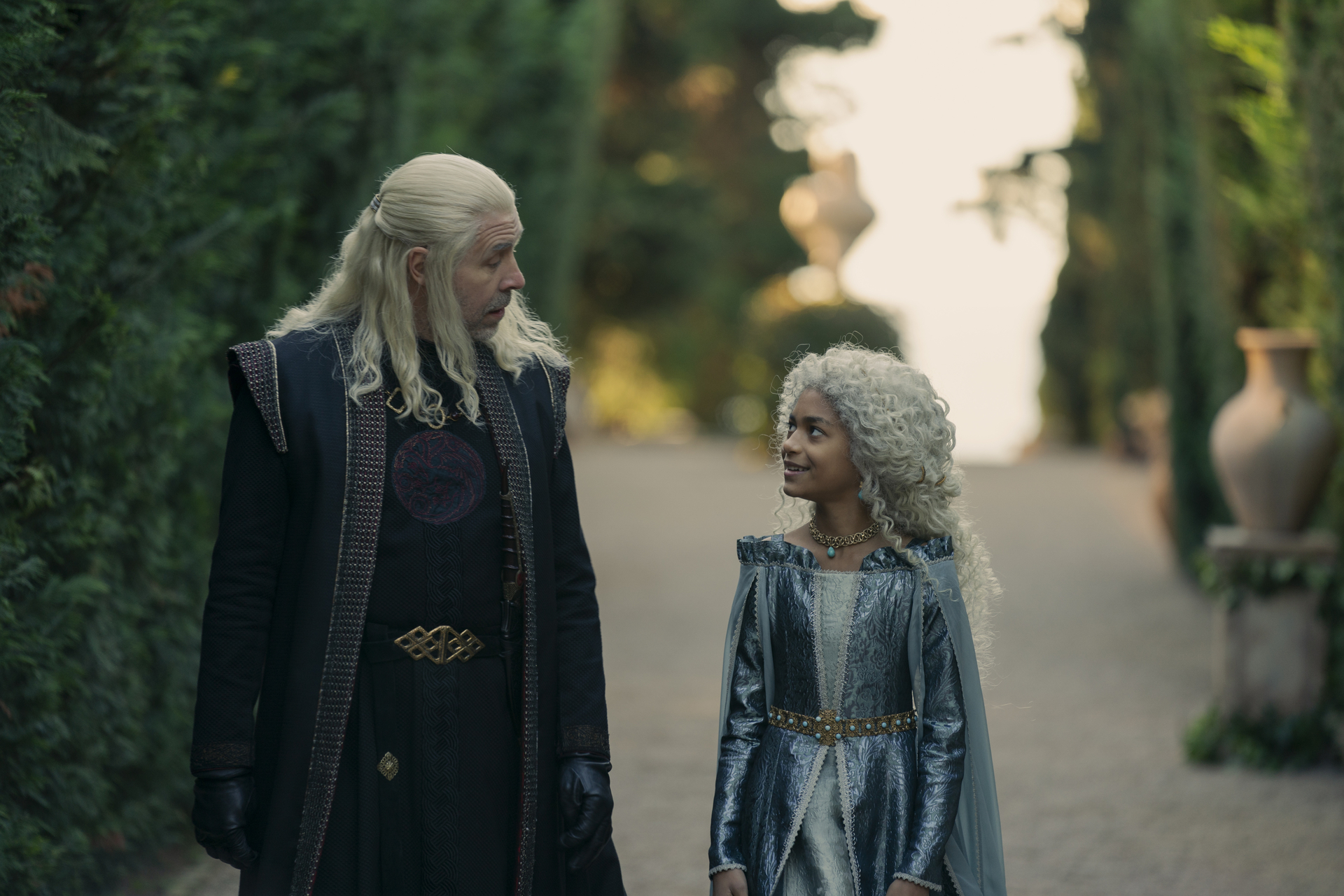
It’s safe to say there were some strong opinions about this week’s new episode of House of the Dragon, “The Rogue Prince.” Maybe it was the underage marriage proposals, maybe it was the crabs feeding on human flesh, maybe it was the newly unveiled opening titles with very familiar music. Whatever you felt most passionate about, someone out there probably felt the exact opposite, and tweeted about it.
Here are the best and funniest tweets of the week, curated by yours truly, from the show-related tags and around the fandom!
Note #1: the episode leaked early this weekend, leading to some premature livetweeting and good-natured ribbing of HBO from the fans.
Note #2: This week we’re trying out the wakelet app, since many people had a difficult time getting the twitcap to load on mobile last week. Might need to give it a minute to load, it’s a lot of tweets because you’re funny fuckers. Hopefully this will work better for you all!
See you next Sunday, indeed.
The post The Rogue Wince: House of the Dragon Twitter Recap appeared first on Watchers on the Wall.
Tensions mount in the second episode, as the decision to name Rhaenyra the heir has some not so unforeseen consequences. Viserys’ daughter struggles to find her feet as the future Queen of Westeros, his brother attempts to assert his strength on Dragonstone, his Hand’s daughter makes herself a tempting option for his new wife, and his enemies wreak havoc on the Stepstones. While Viserys plays with his model of Valyria and ignores the very real problems facing his reign, let’s dive deeper into “The Rogue Prince” with some interviews and videos!
One of the characters who tries to get Viserys to face reality is Corlys Velaryon, to no avail. Steve Toussaint speaks to Newsweek about Corlys’ decision to enlist Daemon’s (Matt Smith) help. “I think Corlys is a guy who’s very pragmatic, something has to be done. So at beginning of that episode, of course, he comes in and says, ‘Look, I’ve lost ships now. This is ridiculous, but what are we going to do about it?’ And as far as he is concerned the council, the king, and Otto were just dithering about. So I think it’s in his nature to just go ‘well, I could sit around and wait for you and just lose more men or I just go with another man of action and we just do this together.'”
That “man of action” turns out to be the king’s brother. As Toussaint explains, “I really enjoyed shooting that scene with Matt [Smith], because it tells you so much about both of them in a way and also the fact that Corlys…does know how to play people. I can’t remember the line now but I think there’s something I say, something like ‘their fortunes were given to them our fortunes have to be made,’ appealing to the vanity of Daemon, knowing that would work.”
He adds, “I think Daemon is also a very interesting character because he’s very dangerous, he just goes his own way. And what I like about Corlys is that I don’t know that there are many other people in court who would have gone to Daemon with this proposition, so, yeah, I like Corlys for what he did, for his actions there, getting something done basically.”
In a separate interview with The New York Times, Toussaint discusses Corlys’ focus on his family and legacy. “When I had the initial meeting with Ryan [Condal] and Miguel [Sapochnik], the co-showrunners, all we talked about, really, was fatherhood and his feelings about his family. He’s got this desire to cement the Velaryon name in history. He feels the slights to his wife [Princess Rhaenys, played by Eve Best], the fact that she was passed over [for the Iron Throne], more than she does. And when he’s realized he can’t get her back on the throne, the next thing for him is get the family as close to power as possible, i.e. marry off the kids in some way or other.”
His efforts to cement a marriage alliance with King Viserys are in vain, however, and Toussaint expresses the frustration Corlys feels dealing with him as well as the other members of the Small Council. “The resentment that Corlys has for what he considers these privileged people helps me a lot. In fact, there were some points where Ryan would have to rein me in and go: ‘If you spoke to the king like that, you’d have your head cut off. You’ve gone too far.’ He adds, “There is a side to him that is, as far as he’s concerned, above the rules. Also, he knows just how valuable he is for the realm, because he controls the majority of the navy. So he knows he’s got a little bit more leeway.”
For more on Corlys’ ambition and how Toussaint is handling the continuing backlash about his casting, check out both articles here and here.
Speaking of marriage alliances, Viserys shocked the Small Council – not to mention his daughter – by announcing his intention to marry Lady Alicent Hightower (Emily Carey). In an interview with EW, Carey expresses her relief that she no longer has to keep the impending union a secret. “I’m so glad I can talk about this now. This is a big one. It changes one of the branches of the show, if that makes sense. It pushes things in a different direction. And for my character it’s, of course, a massive turn.”
Discussing how she wanted approach her scenes with Paddy Considine (Viserys), Carey admits she was unsure what direction to take. “I was confused as an actor in not knowing what Alicent should be feeling, and then I also realized that’s exactly how she’s feeling. ‘I should be happy. This should be what I want, but is it actually what I want?'” She goes on to add that if viewers are tempted to see Alicent as a villain, remember that these are “huge pressures that should not be placed on 14-year-old girls.”
Finally, Carey – who identifies as queer – addresses the romantic undertones in the relationship between Alicent and Rhaenyra, saying that there’s a “tactile closeness and this emotional vulnerability [between teen girls] that you share with one another, it’s almost like having a partner. You want to be with that person all the time…You just want to love that person so deeply, and you think your best friend of 14 is going to be your best friend for the rest of your life. It does toe the line between platonic and romantic. But I also think, at 14, you don’t know what those words mean. You don’t know what the feelings mean. It’s just love. That’s all it is. Whether it’s friendship or more than that, I think it’s up to how you want to see it, but it was talked about for sure.”
Be sure to read the rest – including Carey’s and Considine’s shared love of Drag Race – over at EW.
We’ve seen surprisingly few of the dragons so far, but rest assured more are coming. Speaking with Wired, showrunners Ryan Condal and Miguel Sapochnik share how they approached bringing all 17 dragons to life for the small screen. “With our dragons, you can get the animation, the things that they touch, and how they interact with the real objects, like the ground they stepped on and left footprints. Those kinds of things, you can get that right…But what you want are details that you wouldn’t otherwise notice and would in any normal situation be considered a luxury that you don’t have time for,” Sapochnik says.
He continues, “For example, there are flies on the dragons. That’s what we’ve been focusing on because these are smelly, big creatures, and smelly, big creatures usually attract flies. By having flies, and seeing those little darting shapes that are going around the dragons, it gives you a sense that there’s something more real about this dragon than meets the eye.” It’s a shame we still don’t know exactly what these creatures smell like…
Condal adds that there was a heavy focus on making each dragon unique. “I think we tried to imbue them all with a distinct sense of personality and place within the story, because dragons are a fact of life in this world. They’ve existed for centuries. They’re different ages and sizes and shapes and silhouettes and colors. It was really important to George [R.R. Martin] that we did that, because he envisioned his dragons being very colorful, like bearded dragons and the very colorful lizards that you can see in our biosphere.”
“The biggest dragon is so big that her horns have started to fall off. She looks old, and she has evidence of former saddles on her because people had to re-saddle her as she grew and grew. Some of the old saddles, they just put a new saddle on top of the old. Other dragons are young and juvenile and still learning the world. They’re more curious, like the velociraptors in Jurassic Park. Daemon’s dragon is very cantankerous and twitchy and never stops moving, kind of like his rider.” Given the number of dragons we will eventually see, it’s nice to know we’ll be able to differentiate them by their appearance.
The entire interview is available here.
In this week’s “Inside the Episode,” showrunners Miguel Sapochnik and Ryan Condal, director Greg Yaitanes, and cast members Milly Alcock, Eve Best, Paddy Considine, and Emily Carey discuss the ramifications of Rhaenyra being named heir and Viserys choosing a new wife.
In case you missed it, here is the preview for episode three:
The post House of the Dragon Post-Mortem of “The Rogue Prince” appeared first on Watchers on the Wall.
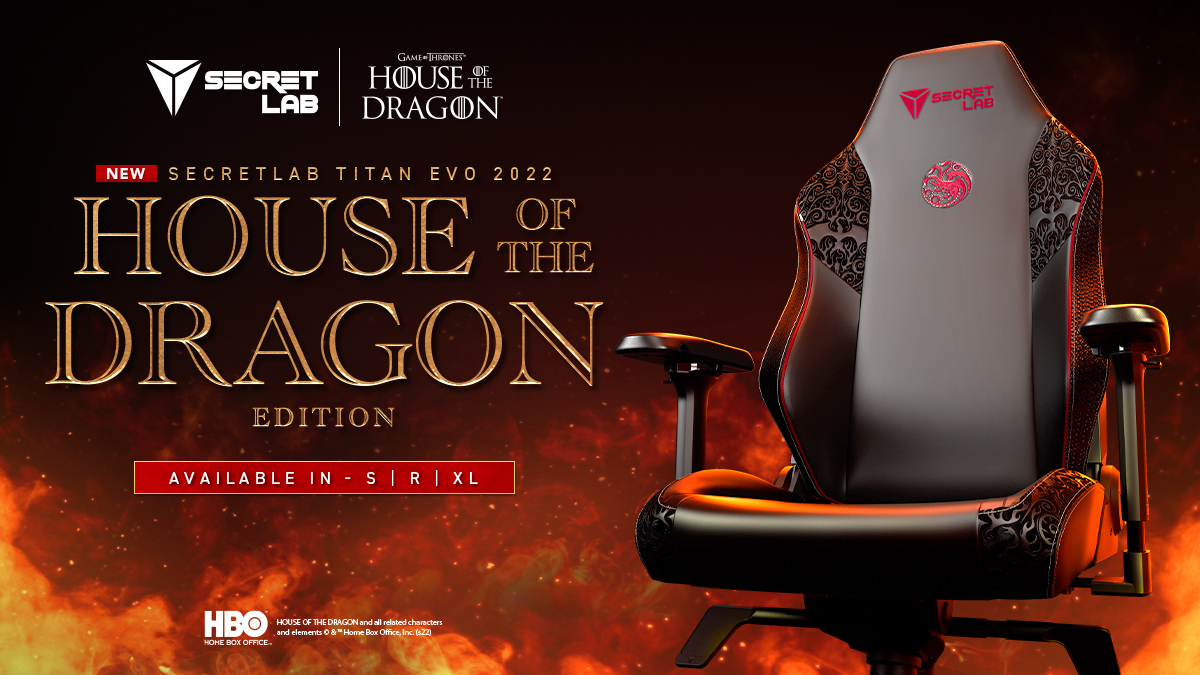
We hope you enjoyed this week’s new episode of House of the Dragon! House Targaryen and their dragons were on full display in “The Rogue Prince” and so they are too in our first giveaway of the season, courtesy of Secretlab. The giveaway features the Secretlab TITAN Evo 2022 House of the Dragon Edition Chair, embellished with elaborate dragon scale leather and the Targaryen sigil stitched on the front and back of the backrest in intricate red and white embroidery. The chair, now available for pre-order, is the latest addition to the Secretlab Game of Thrones Collection.
Today we choose our winner, after a week of gathering entries across Twitter, Facebook and here at Watchers on the Wall.
We’re thrilled to announce the lucky winner is….
Thank you to everyone who entered the giveaway, and best of luck to you all in Watchers giveaways to come throughout the season!
The post Announcing the Winner of the Secretlab TITAN Evo 2022 House of the Dragon Edition Chair Giveaway! appeared first on Watchers on the Wall.
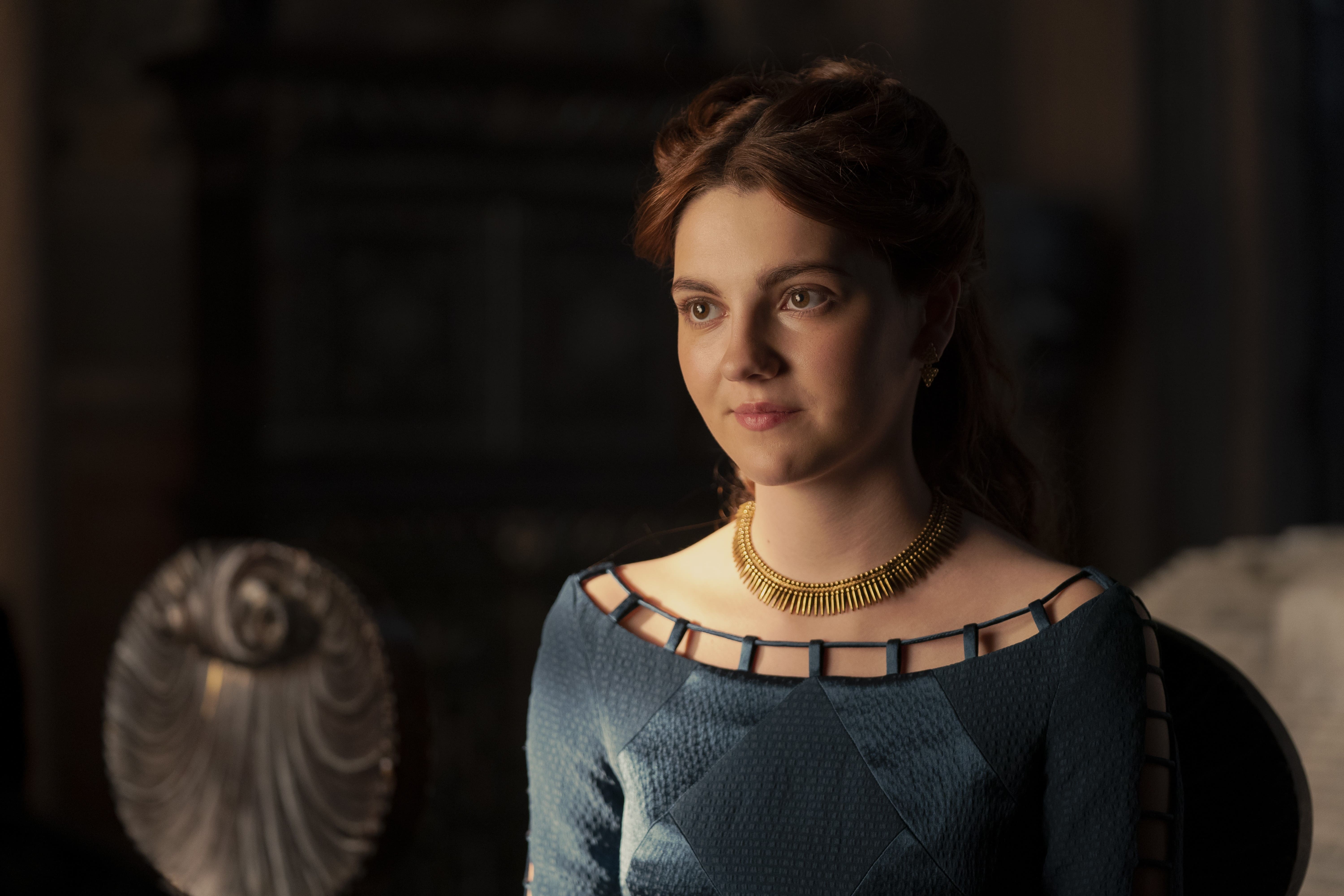
Welcome back, for week 2 of House of the Dragon. If you made it past the tourney and the C(itadel)-section, you’ll do just fine. Settle in and enjoy the show!
Spoiler Note: This recap and the comments section may contain mild spoilers from George R.R. Martin’s novels and Westeros histories, whether or not that material has appeared on the show yet. If you have not read the books and wish to remain completely Unsullied, we encourage you to check out our non-book-reader recap by Oz of Thrones!
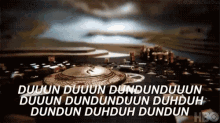
Wait that’s not quite right, is it? Needs more blood! Just oceans of the stuff. That’s what the opening credits were always missing.
All kidding aside, it’s good to hear the familiar strains of Ramin Djawadi’s ultra famous opening theme for Game of Thrones, and to see a similar visual composition in play for HOTD’s opening credits, tweaked for House Targaryen. But…I can live without seeing rivers of blood every week. I understand the reference and symbolism, but it’s still gross and I suspect I’ll be skipping the opening credits a lot more than I did with GoT. Your mileage may vary on the ick factor.
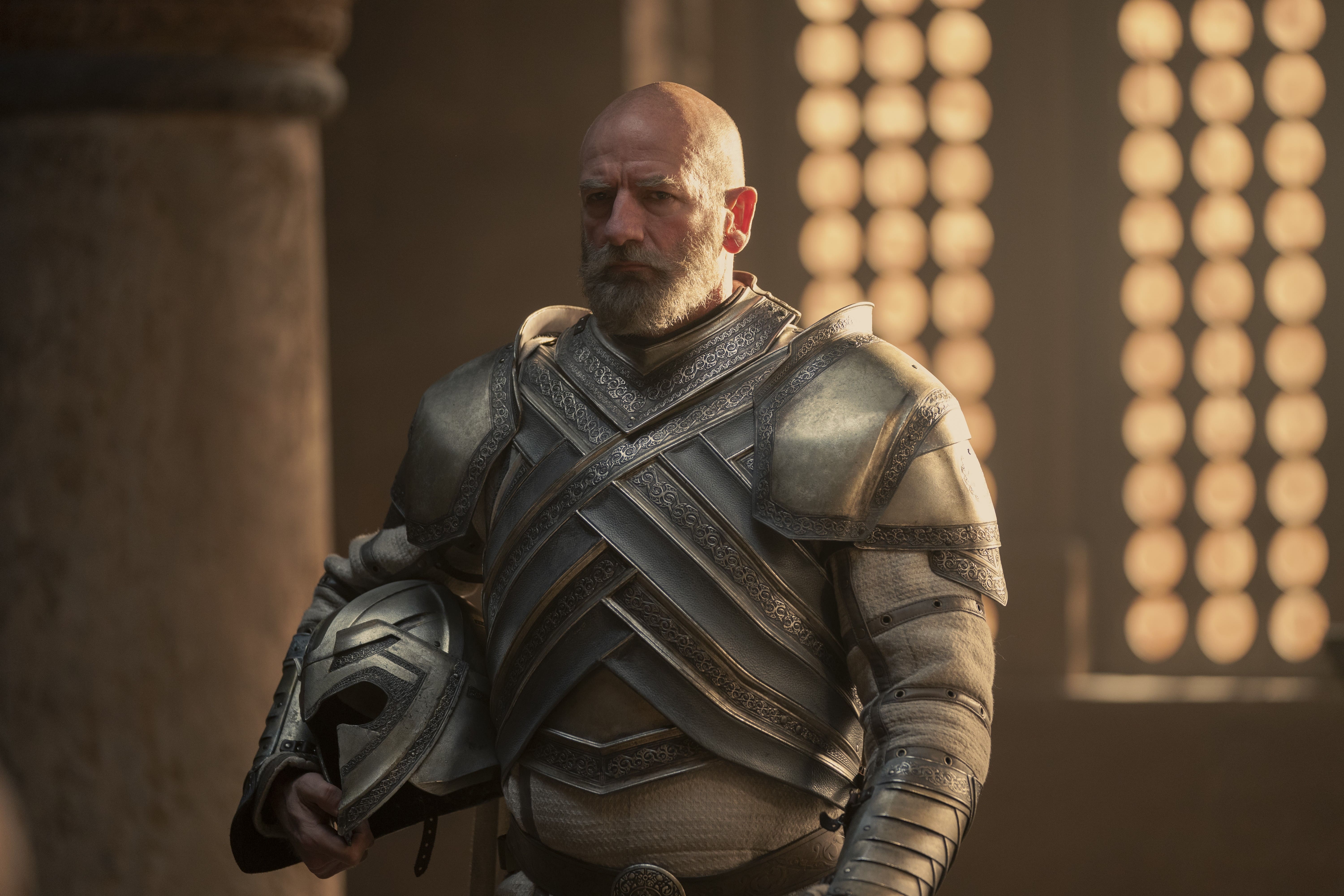
Diving into the episode- we say so long to Ser Ryam (we hardly knew ya), and Harrold Westerling gets a promotion in the Kingsguard. The Kingsguard will need to replace Ser Ryam ASAP since kings die like flies in Westeros.
Corlys Velaryon is mad as hell at the Small Council meeting; Craghas Crabfeeder has been seriously on his shit and it’s hitting his business hard. We also get a not so subtle hint that half a year has passed since the last episode. The adults are talking and Rhaenyra the cupbearer gets shushed when she tries to contribute.
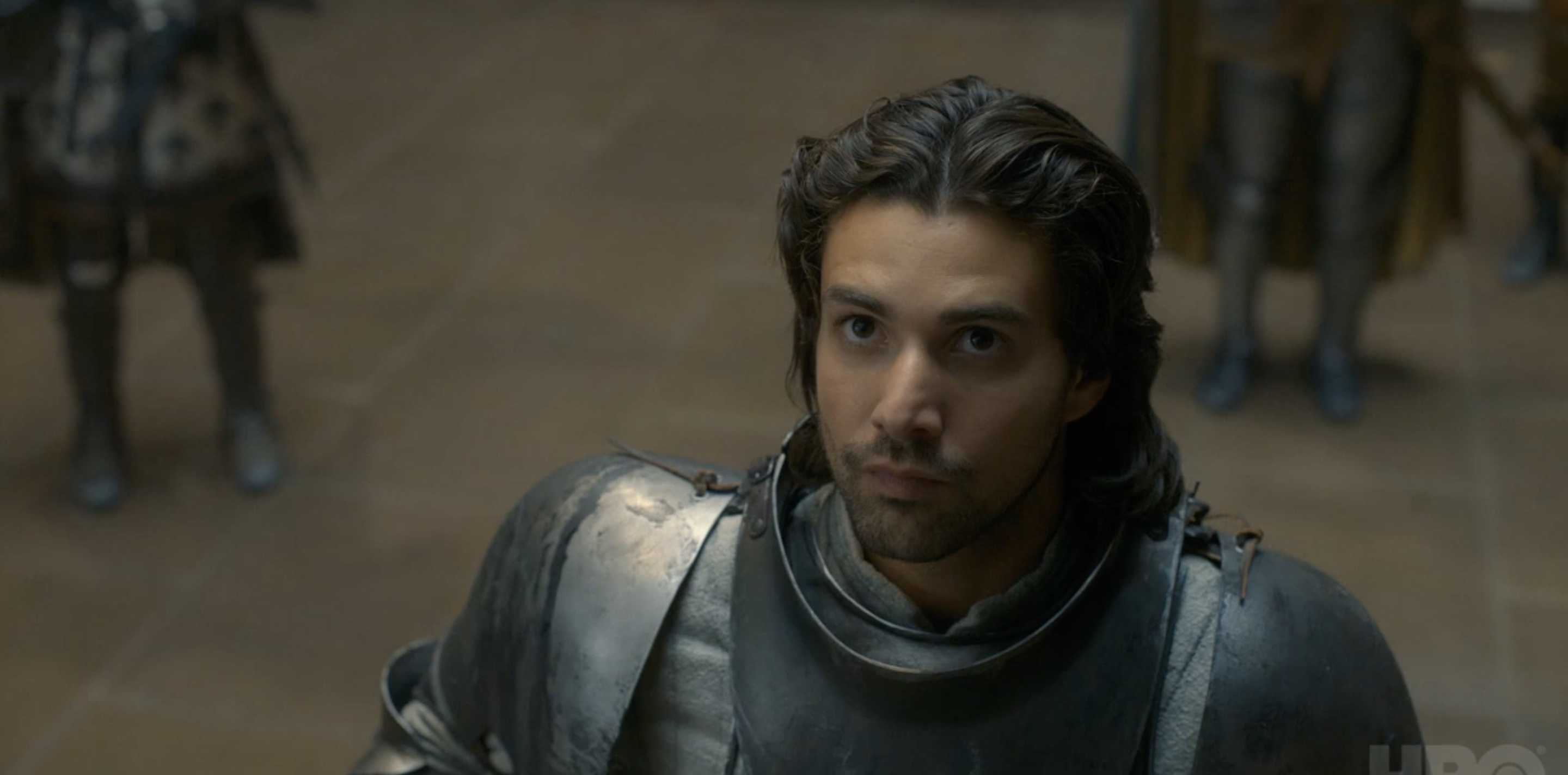
Sent off to shop for a new Kingsguard, she opts for a tested warrior over the political choices foisted upon her by Otto Hightower. If the more experienced knight happens to also be scorchingly hot, well Rhaenyra can’t help that. It’s not her fault that Ser Criston Cole is as handsome as he is good with his sword. But it is a bonus.
Meanhile, Viserys is playing with his dragon minifigs and Dragonstone Dreamhouse. Alicent has been spending time with him regularly, having their little chats, and sir? Please step away from that young girl and have a seat. He asks her not to tell Rhaenyra about their developing whatever-this-is because he knows. Stop trying to fuck your daughter’s girlfriend, Viserys. You know this is not correct.
Rhaenyra and Alicent meet for a tender reassuring chat and kneel around an astounding amount of candles. Between the candlelight, girltalk, handtouching, and sapphic longing? Frankly, with the scene we’re getting here, it feels like a TV show that would probably get canceled after one season on Netflix. Except knowing how these two wind up, it feels like queerbaiting. Unless they actually have it go somewhere, despite the fate written for these two in the books and showed to us so far in the trailers. Martin, Sapochnik and Condal might not completely alter a story but they could add some details and moments in.
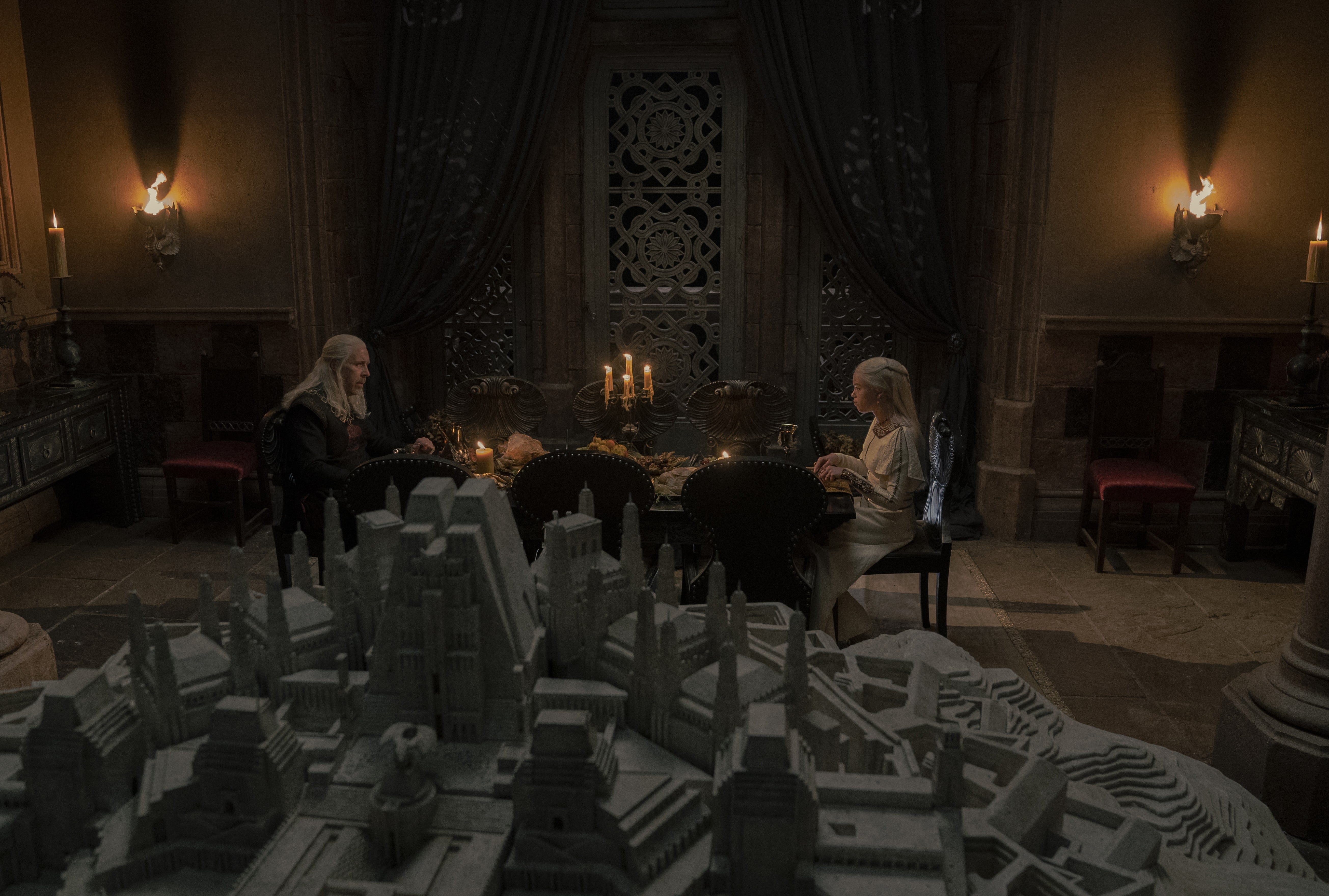
The Velaryons approach King Viserys with a proposal- a wedding one, and now he has two underage women to contend with, as they suggest the king marry their young daughter Laena. It would strengthen their alliance and Viserys’ flagging reputation. (Plus they’re related through Rhaenys so maybe they thought he’d be into that? I dunno.)
Rhaenyra and Viserys dine together, painfully, awkward. (I’m wondering, where are the servants? They’re still royal. Anyway.) After the Small Council meeting earlier, they don’t know how to talk to one another.
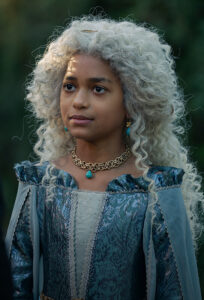 In other news, the Iron Throne is literally killing Viserys. (Take a hint, V.) The cut received from his throne has festered and he’s close to losing a finger. So here comes ye old Maggot Cure! Otto takes this opportunity to bend the king’s ear about marital alliances. They think the Velaryon proposal could be good but Otto clearly has other plans in the works.
In other news, the Iron Throne is literally killing Viserys. (Take a hint, V.) The cut received from his throne has festered and he’s close to losing a finger. So here comes ye old Maggot Cure! Otto takes this opportunity to bend the king’s ear about marital alliances. They think the Velaryon proposal could be good but Otto clearly has other plans in the works.
Viserys meets with the LITERAL CHILD the Velaryons have proposed he marry. She is small and trying to be very good, and it’s tragic. Viserys is not down with this, and that is reassuring.
Rhaenyra and Rhaenys cross paths at the keep, and it might be educational for the princess. Rhaenys’ cynicism is on full display, especially after helping her husband nudge her daughter at the much older king. She doesn’t have any faith in the men of their world, who will never let a woman rule. But Rhaenyra declares there will be “a new order.” Ooof, that sounds familiar.
Viserys and Alicent discuss the problematic proposal, and she brings him one of his figurines for his playset, repaired. Alicent fixed his dragon- it’s symbolic you see. Subtle. He’s deeply touched by the gesture. But Otto cockblocks his own daughter because news! Dragon news!
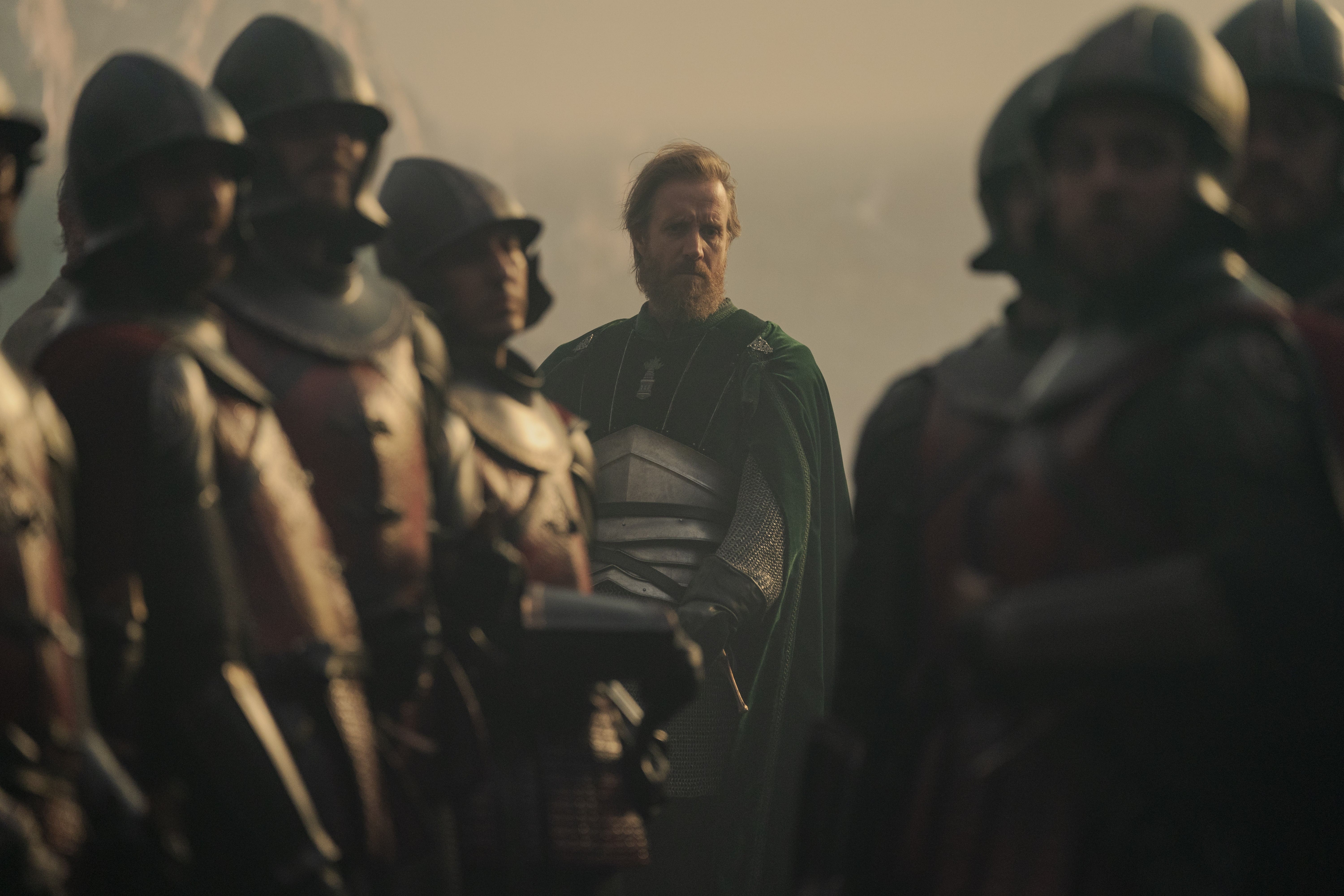
After parking his butt in Dragonstone for six months, Daemon Targaryen makes a move by pranking his big brother. The rogue prince snatches a dragon’s egg (the one meant for Baby Baelon no less) and announces his intention to marry and have a baby with his companion Mysaria. The Small Council sees it for the obvious provocation it is and sends Otto. He’s expendable, and kind of annoying.
Daemon enter slinging the egg around like a football, and we finally get some action in this rather slow-moving episode. But I don’t know if talking shit on a narrow staircase is It, Otto, and also, people forgot that Daemon has a dragon. So there’s that. The scene is tense, on the edge of fighting, when Rhaenyra busts in with that “show of force” she wanted, riding Syrax.
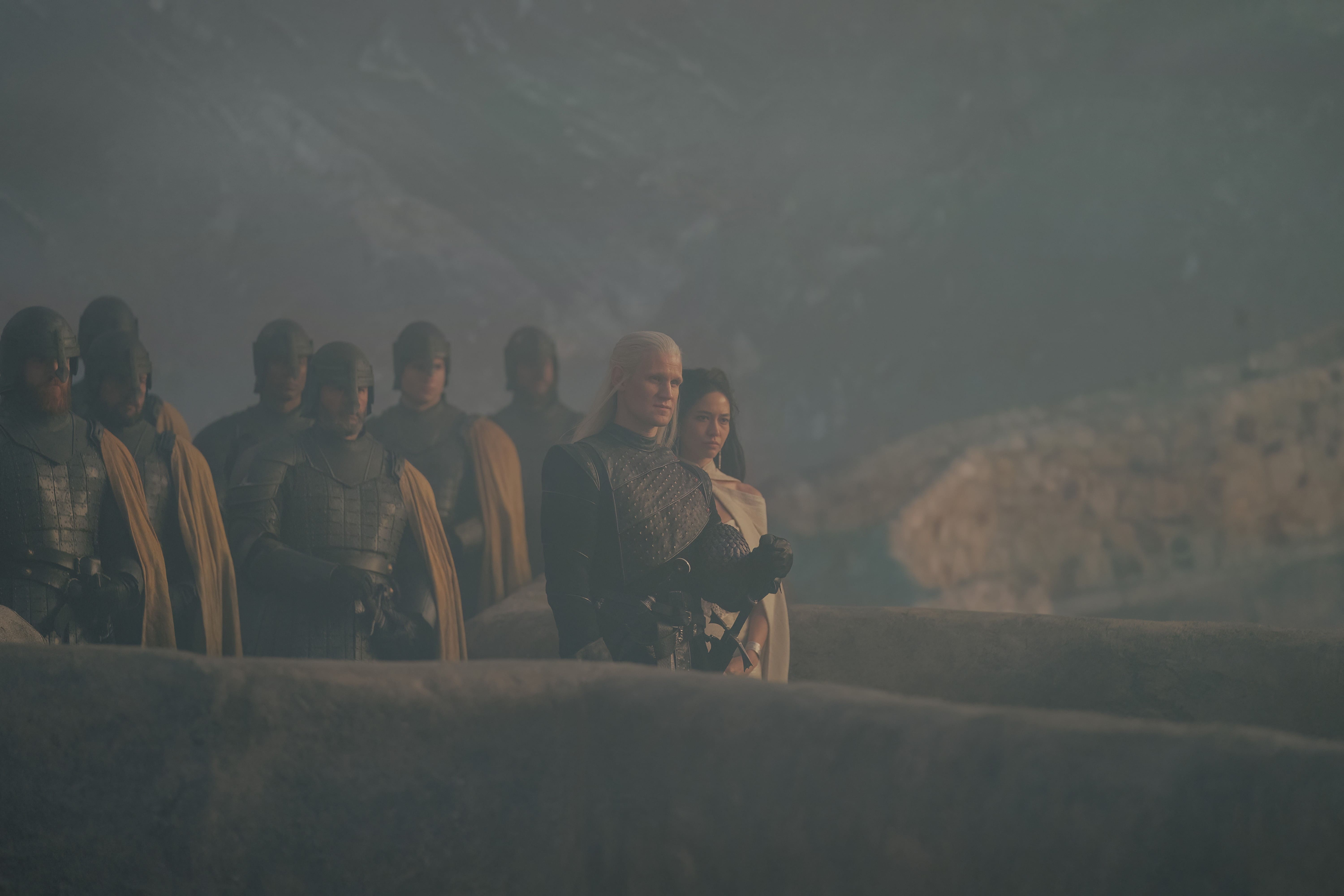
Defanged by his niece’s arrival, Daemon admits his bluff, and gives the egg back. Mysaria retreats. Perhaps surprisingly she is unafraid to call out the prince on his lies, and the danger he put her in, in this situation.
Viserys consults with Small Council member Lyonel Strong about the marriage business. Strong councils him to marry Laena and thereby keep Corlys secured as his ally. Gross but strategically sound.
After Rhaenyra’s stunt at Dragonstone, the king is mad as hell when she comes home. But Rhaenyra has matured quite a bit in a short amount of time. She counters with her accepting of his need to get married, because duty to the realm is the most important thing. They’re at peace. (Temporarily. It’s hard raising a teenager.)
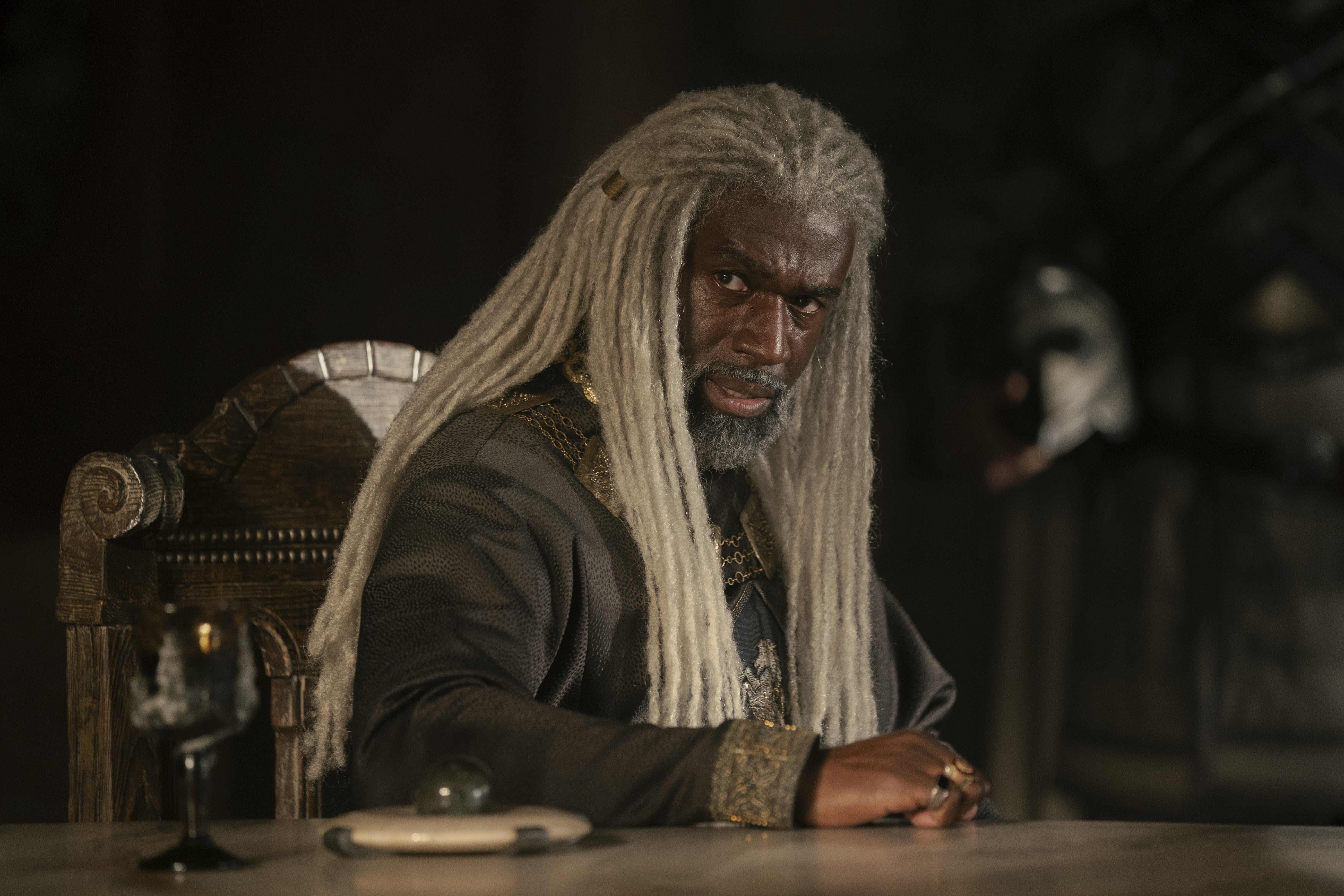
After much dithering, Viserys has made his decision and makes the announcement he will be marrying the lady Alicent Hightower. Corlys is naturally angry, Otto is smugly satisfied and Rhaenyra is floored and teary. Most notably, Alicent does not look like a girl who just got proposed to by a king she cares about. She looks pretty miserable, actually. But the deed is done, the proposal made.
Somewhere else, Corlys explains himself: the Velaryons are an ancient house but he had to make his own fortunes. It’s a neat little villain monologue to reveal that of course Viserys has driven him directly to Daemon- because what else would he do? He needs help in stopping Craghas Crabfeeder and Viserys isn’t helping. Now the king has spurned his daughter. Corlys has made a move, and the king has made a powerful enemy.
Opening Credits Returns! I’m actually surprised they reused original main title theme. Obviously it’s hugely associated with GoT, so they probably wanted to work with that to make the emotional connection but I would’ve thought they’d want to establish their own identity more. So I was expecting new music by Djawadi. Dare I say, I was slightly disappointed by hearing the same music! The animations are beautiful and so creative, but like I say in the recap…I don’t really want to look at rivers of blood a lot. I think these opening credits are going to be a little more divisive than the original.
Kingsguard’s Wear Daily: I don’t remember the Kingsguard helmets looking like Magneto.
Rhyming Sorceresses: Mysaria framed with the familiar Dragonstone carvings behind her gave me strong Melisandre flashbacks, and it felt a little deliberate. (In addition to positions, their back stories are also similar.) This Mysaria is a little different from the one sketched out in Fire & Blood; once again we have HOTD bringing up a reproductive choice (Mysaria eliminating her ability to have children). Mysaria in the book was actually pregnant with Daemon’s child when he stole the egg. It will be interesting to see if women’s autonomy over their bodies in this way continues to be a throughline throughout the first season. Certainly women’s power in general (and lack thereof) is a major storyline point.
Are there sides? Fan gets caught up in good/bad debates and Great House stanning, but ultimately can characters in this world ever be boiled down to a simple essence that way? I jokingly refer to Corlys’ final comments as a “villain monologue” but I don’t think of him as a villain. For him this is the reasonable strategic maneuver, even though it will put him at considerable risk. He would consider Viserys a villain (and a fool and a bad king) for choosing a bride with no Valyrian blood who did nothing to shore up alliances or save men. And we as viewers were side-eyeing the lot of them for the marriage business tonight. Whatever the answer is, I think it’s a good sign that House of the Dragon can spawn interesting questions only two episodes in.
Slower but steadier – Tonight’s episode was..maybe not a tortoise, but not a hare either. In comparison to last week’s traumatizing, nonstop action and dizzying jumps from one big scene to another, this episode took more time to build and gave us more time to breathe. I appreciate that we’re getting to know the Small Council members, and the way all the characters inhabit this world.
Steve Toussaint – He’s absolutely a star. I don’t look anywhere but at him when he’s in the room. The folks in charge knew what they were doing when they cast him. I can’t wait to see Corlys get up to shit next week.
Targaryen Family Matters – This episode did tremendous work in developing believable family dynamics between Viserys and Rhaenyra. Which is weird when we’re talking about dragons, dragonriding, kingdoms, remarriage potentially with way-too-young people, etc. But the uncomfortable dinner and Daemon’s conflicted feelings about his brother grounded the wild world of Westeros in something familiar- complicated family shit, muddied with hurt feelings.
Ser Ryam Redwyne, Lord Commander of the Kingsguard (Played by Garry Cooper)
The post House of the Dragon Season 1 Episode 2 “The Rogue Prince” Recap appeared first on Watchers on the Wall.
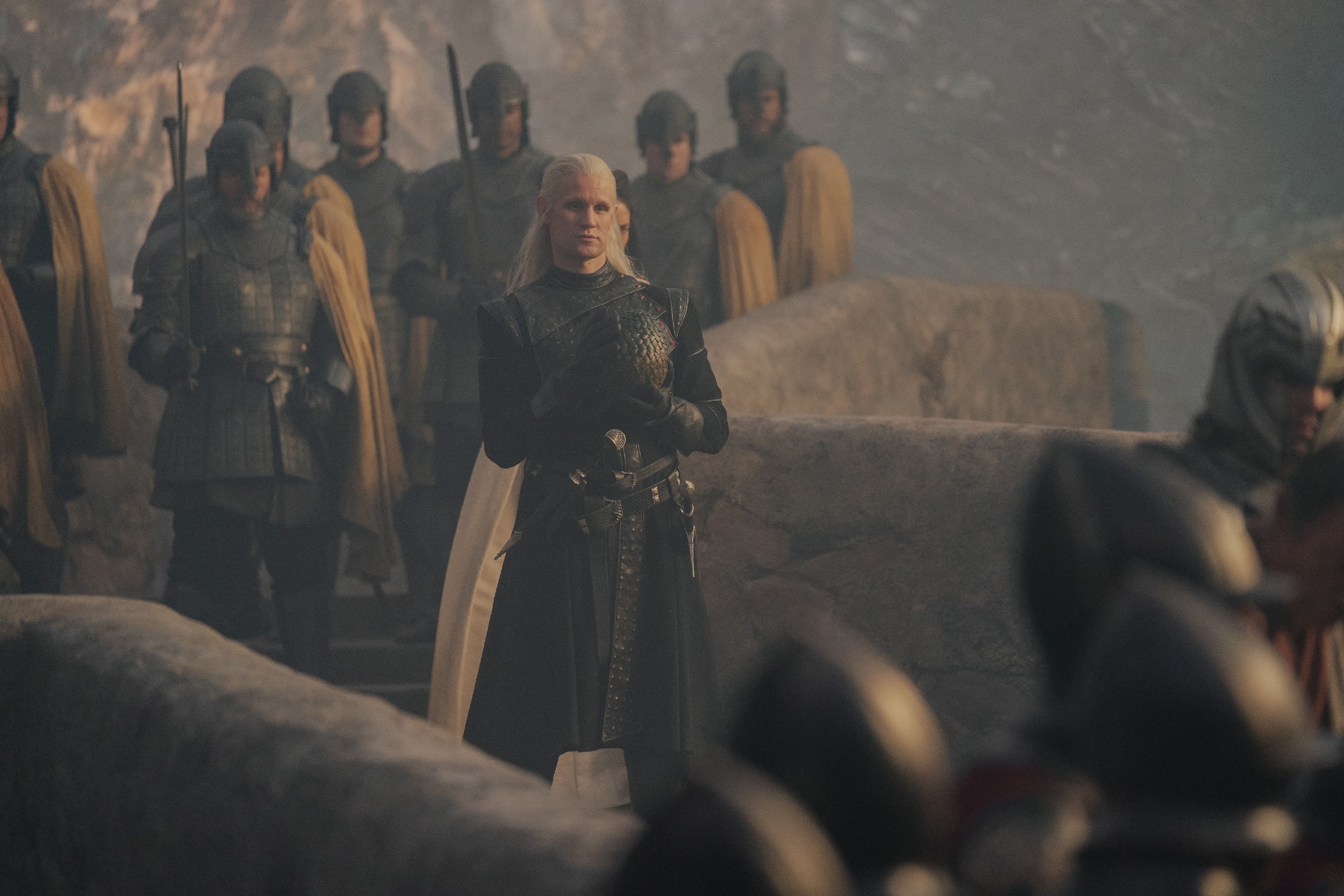
House of the Dragon Season 1, Episode 2
Writer: Ryan Condal
Director: Greg Yaitanes
Runtime: 54 min.
Content Warnings: TV-MA: Adult Content, Adult Language, Brief Nudity, Violence
Video Preview: Weeks Ahead trailer
Episode description: Princess Rhaenyra dives deep into the prophecies about House Targaryen while confronting a realm that resists the idea of a woman on the Iron Throne, and Prince Daemon, embittered over being passed over as the heir to Westeros, prepares to go to war.
Please use spoiler coding when discussing book or filming spoilers. (Instructions in our FAQ)
Please do not post ANY episode leaks in this Chat post before it airs on HBO/HBOMax at 9PM Eastern time. Leak discussion IS freely permitted in our Quarantine forum.
Spoiler coding is required in the Open Chat post prior to the episode official airing (9PM EDT tonight!). After the episode has aired, you don’t have to cover spoilers from the episode anymore. Thank you for being considerate of your fellow fans!
Before you go, don’t forget about our latest giveaway: you have less than a day left to enter your comment on the giveaway post and get your chance to win a Secret Lab TITAN Evo 2022 House of the Dragon Edition Chair!
The post House of the Dragon Season 1 Episode 2 – The Rogue Prince – Open Chat appeared first on Watchers on the Wall.
Daemon Targaryen: I heard your father was hosting a tournament in my honor.
Rhaenyra Targaryen: The tournament is for his heir.
Daemon: Just as I said.
Rhaenyra: His new heir.
Daemon: Until your mother brings forth a son … you are all cursed with me.
Rhaenyra: Then I shall hope for a brother.
In the premiere episode of House of the Dragon – along with re-introducing viewers to the setting of King’s Landing and introducing several of Daenerys Targaryen’s storied ancestors, the show specifically presented a potential succession crisis.
King Viserys Targaryen (the first of his name) had been hoping – dreaming even – to welcome a son into the world; a son who would be named his heir. Tragically, his wife Queen Aemma did not survive the Westerosi standard of obstetric care and her reasonable request that her current pregnancy be her last one was realized in the most terrible way possible. Their newborn son Baelon did not long survive his mother.
With the king suddenly a widower, his small council called for an emergency session. Prior to Aemma’s pregnancy, the king’s brother Prince Daemon Targaryen was the heir-presumptive to the Iron Throne. For only a brief time, baby Baelon was the heir –
Prince Daemon: For a day.
On this meeting’s agenda was an estate planning proposal to remove Daemon as Viserys’ designated successor for fear that he would be unsuitable as a monarch, should something ill-fated happen to his royal brother.
Otto Hightower: Daemon would be a second Maegor, or worse. He is impulsive and violent. It is the duty of this council to protect the realm and the king from him.
Hand of the King Otto Hightower suggested that the king’s eldest child, Rhaenyra Targaryen, could be a replacement heir, triggering in response the usual arguments of male-preference primogeniture disqualifying her, although Master of Ships Corlys Velaryon tried to ride Otto’s feminist suggestion to favorably position his wife Rhaenys, the king’s elder cousin, who already had a male heir.
King Viserys, uncomfortable with conversations calling for hard decisions, tabled the matter with Daemon’s position as default heir-presumptive intact.
Daemon: You are all cursed with me.
There were unspoken interpersonal factors happening that encouraged some councilors to suggest Rhaenyra as a successor replacement to Daemon – Otto Hightower in particular had a personal investment in not seeing a Daemon Targaryen administration – but the factors can largely be boiled down to the representation of Daemon as an unsuitable potential king.
This idea of choosing an alternate ruler to prevent the reign of a suboptimal candidate is a situation we’ve seen before in Westeros.
THE BARATHEON HEIR
“This is the will and word of Robert of House Baratheon, the First of his Name, King of the Andals and all the rest—put in the damn titles, you know how it goes. I do hereby command Eddard of House Stark, Lord of Winterfell and Hand of the King, to serve as Lord Regent and Protector of the Realm upon my … upon my death … to rule in my … in my stead, until my son Joffrey does come of age …”
“Robert …” Joffrey is not your son, he wanted to say, but the words would not come. The agony was written too plainly across Robert’s face; he could not hurt him more. So Ned bent his head and wrote, but where the king had said “my son Joffrey,” he scrawled “my heir” instead. The deceit made him feel soiled. The lies we tell for love, he thought. May the gods forgive me.
— Eddard XIII, A Game of Thrones
In Season One of Game of Thrones, honorable protagonist Ned Stark was faced with the situation of an unsuitable ruler about to take their seat on the Throne, with Ned being in a position to either allow that to happen or to influence the event otherwise.
Prince Joffrey Baratheon (as was soon discovered during his brief reign) was bound to be a terrible king, but that wasn’t the disqualifying factor to Ned Stark.
Ned: I mean, kings are kings. Whatchagonnado?
Joffrey was unsuitable because he wasn’t a trueborn son of the king. From the traditional rules in effect for succession, Joffrey would have little claim even if he had been one of Robert’s many bastards, a category in which—as a bastard of Jaime and Cersei instead—he didn’t fit. If Joffrey had been Robert’s legitimate son though, Ned would have had little misgivings about legitimacy, and would have likely transcribed Robert’s words exactly.
But imagine if Joffrey, rather than being the nightmare bloodthirsty brat that he was, had been a thoughtful and progressive-minded individual, perhaps inspired by the example of Aegon V as his kingly role model. Would that have mattered?
Ned: Nope. He can’t be king. Unless I hadn’t known that he was a bastard.
Since Joffrey was not eligible to be king, Ned hesitated in specifically naming him in Robert’s will, and his use of the nearly-equivalent term “the heir” could be unpacked after the king’s passing. From Ned’s point of view, the crown should pass to Stannis Baratheon, the eldest of King Robert’s two younger brothers.
Stannis: I’ll remind you all that I am “of age” as well. No need for a regency.
Much like Viserys’ small council had issues with Daemon being heir, with Ned planning on enforcing his role as regent until Stannis could come to King’s Landing to press his claim, small council members Renly Baratheon and Petyr Baelish lobbied against committing to the painfully-stern and righteous Stannis as the next monarch.
Renly Baratheon: Does it seem fair that Stannis becomes king, when I’m so much more dashing? Kings should be dashing. Like in the songs. Just think of the tragedy to befall the realm, to be denied a dashing, sexy king!
Petyr Baelish: I mean, Stannis is … an interesting choice, no denying. But maybe a choice we don’t choose? Let’s just play along with Joffrey as our puppet ruler and see how things go. And if Joffrey and Cersei happened to slip one day and fall in the dry moat …
*Ned checks the Baratheon family tree, scratches out Joffrey, Myrcella, and Tommen, and circles Stannis.*
Ned: No. It’s Stannis. You are all stuck with him. Get used to it.
Petyr: Cursed, more like.
Of course, Renly quickly left the capital for safety in the Reach, Baelish arranged a double-cross, and Ned was unsuccessful in securing his position as regent.
Ned produced Robert’s letter. “Lord Varys, be so kind as to show this to my lady of Lannister.”
The eunuch carried the letter to Cersei. The queen glanced at the words. “Protector of the Realm,” she read. “Is this meant to be your shield, my lord? A piece of paper?” She ripped the letter in half, ripped the halves in quarters, and let the pieces flutter to the floor.
“Those were the king’s words,” Ser Barristan said, shocked.
— Eddard XIV, A Game of Thrones
Joffrey was installed as king, Ned lost his head, and the War of the Five Kings began.
That’s a lot of kings, although to be fair – two of them were the result of the secession of the North under Robb Stark, and Balon Greyjoy declaring himself king of the Iron Islands.
Of the three kings asserting a claim on the Iron Throne, Joffrey’s claim was based on his illegitimacy not being widely recognized, Renly’s claim was based on being dead King Robert’s more charismatic brother, and Stannis’ claim was based on being older than his more charismatic, younger brother.
Stannis: I feel that my claim has more weight than just that.
Stannis did try to remind everyone of the basic laws of succession, rules that were usually adhered to throughout the realm. He sent out ravens to many of the lords of Westeros, stating his facts.
Stannis: Dear lords, Joffrey is a bastard, Renly is my little brother, you are all cursed with me.
Maester Cressen: I’ll punch it up a bit.
Maester Pylos: Or I will.
Maester Cressen: I can do it!
Maester Pylos: Of course you can, I’m not here to totally replace you.
Stannis was a bit dismayed that most of the lords did not immediately lend support to his claim.
*Stannis checks his Baratheon family tree chart again, with his name circled and a little crown drawn in the margin.*
The problem for Stannis is this: the rules of succession in the end are mostly guidelines, a fact that is brought up in Season Two of Game of Thrones by Lord Varys, the Master of Whispers and political mastermind.
RIDDLE ME THIS, HALFMAN
Varys smiled. “Here, then. Power resides where men believe it resides. No more and no less.”
“So power is a mummer’s trick?”
“A shadow on the wall,” Varys murmured
— Tyrion II, A Clash of Kings
While Tyrion Lannister was managing the realm as Hand of the King, Lord Varys gave him a riddle about power, with the summation being that power resides where men believe it resides. By extension, the rules for succession and precedent and traditions are only binding if they are empowered by the belief of those who might follow them.
Stannis: Laws should be made of iron, not of pudding.
As Ned discovered, these things are often not made of iron, but of less hardy materials.
Cersei: Is this meant to be your shield, my lord?
Ned Stark had as much legitimacy to be Protector of the Realm as Stannis had to being the next king of Westeros. Perhaps more for Ned, since Robert’s final directives established Ned as regent and only by Ned’s subtle changes to the document had Stannis the seal of approval from his older brother’s last words. But the letters Stannis sent out to the various lords had as much success as Ned delivering Robert’s will to Cersei. Neither the lords nor Cersei had much interest in recognizing the claims on the respective papers.
Stannis was just not an appealing candidate.
Renly: Unlike me, with all of my powerful friends I’d made while Stannis brooded in his chambers.
Stannis found himself in a similar situation to Daemon Targaryen – on the outside with power just out of reach.
The rules of male-preference primogeniture favored the relative positions of both Stannis and Daemon – being the brothers of their respective kings, but their positions were overtaken by younger relatives who had more tangible support, support which considered the two brothers-of-kings unsuitable as the next monarchs.
Renly had the support of the lords of the Reach and half of the Storm lords, Rhaenyra had the support of the king, who compelled the high lords of the realm to recognize Rhaenyra as heir-designate.
Stannis: I prefer not to repeat myself, ser, but I shall this time. Laws should be made of iron, not pudding.
Stannis might have wanted laws to be made of iron, but in truth, it’s the number of iron swords supporting a claimant that matter more, regardless of the laws.
Gendry: We mostly make swords out of steel, and not simply of iron. But since steel is an alloy of iron, I guess that’s technically correct.
Westeros has laws and traditions concerning succession – it’s a self-perpetuating system because the eldest sons who inherit also enforce the rules, and they’re likely to insist that they (and everyone else) are to be succeeded by eldest sons, to avoid any commentary or examination on how they got their position of power in the first place.
King Viserys pushed back on tradition by designating his daughter Rhaenyra as heir (even though this could appear to cast shade on past decisions that favored his line of succession over his older cousin Rhaenys’ line.) But as king, the people believed that he had the power to enact this despite any contradictions.
Renly Baratheon pushed back on tradition by asserting that he should be king over the claim of his elder and unpopular brother Stannis.
Renly shrugged. “Tell me, what right did my brother Robert ever have to the Iron Throne?” He did not wait for an answer. “Oh, there was talk of the blood ties between Baratheon and Targaryen, of weddings a hundred years past, of second sons and elder daughters. No one but the maesters care about any of it. Robert won the throne with his warhammer.” He swept a hand across the campfires that burned from horizon to horizon. “Well, there is my claim, as good as Robert’s ever was.
— Catelyn II, A Clash of Kings
Renly felt comfortable in doing this because enough powerful people (with swords at their discretion) agreed to go along with Renly’s untraditional argument. Renly’s ambition might have paid off, had Stannis not relied on a different form of power, a different shadow on the wall.
Melisandre: Look to your sins, Lord Renly. The night is dark and full of terrors.
Laws might not matter when swords are employed to make new rules, and swords might not matter when sorcery is utilized. And nothing succeeds like success. Following Renly’s mystical assassination and the promise of removing some extra kings without relying on legal wrangling or risky battles, it was not too difficult to convince Stannis to experiment with some curses using royal-bastard-blood-filled leeches.
Stannis: The usurper, Robb Stark. The usurper, Balon Greyjoy. The usurper, Joffrey Baratheon.
The answer to Varys’ riddle, of power residing where men believes it resides, is a good framework with which to view most of the exercises of power in Game of Thrones, and presumably in House of the Dragon as well. But it’s not a perfect maxim for all situations though, as Stannis found out as he relied more and more on Melisandre’s magical abilities.
To contrast Varys’ straightforward power summation, magical power doesn’t only conform to the strength of men’s belief. There are costs to using such powers.
“We free folk know things you kneelers have forgotten. Sometimes the short road is not the safest, Jon Snow. The Horned Lord once said that sorcery is a sword without a hilt. There is no safe way to grasp it.”
— Jon X, A Storm of Swords
Stannis could not rely on the law as the lords ignored his claims, found himself outmatched militarily against Renly and later in the North against the Boltons, and became an accursed kinslayer in exchange for magically-produced fair weather that let him march his greatly reduced army towards doom. The consequences of all his actions in trying to overcome his unsuitability finally caught up to him.
Stannis: You are all cursed with me.
In Game of Thrones, the actions people took to secure their place on the Iron Throne, either in the pursuit of the throne or to maintain their control of the literal seat of power, almost always caused tragic consequences to the people closest to them. The premiere of House of the Dragon wasted no time in taking us back to that familiar scenario.
The post You Are All Cursed With Me appeared first on Watchers on the Wall.
HBO has just announced a new weekly documentary series for House of the Dragon, in which cast and crew will delve into the production of each episode in this first season. The first one which corresponds to the series premiere, “The Heirs of the Dragon,” is now available on HBO Max in the USA.
In the clip above from this week’s episode, the crew describe how the tourney came to life for the series premiere. With lots of cool concept art, too!
If you also want to get a behind-the-scenes look at how the Iron Throne, Balerion’s skull, and more were created, the full first episode of the docuseries is already streaming on HBO Max. Personally, I can’t wait to watch this series each week! It feels like such a privilage to have a weekly behind the scenes documentary for the show; not after the entire season is over and not only found in DVDs and Blu-Rays, but weekly and focused on each episode individually.
The post “The House That Dragons Built”, a weekly behind the scenes docuseries, arrives on HBO Max—with a clip! appeared first on Watchers on the Wall.